Capital Update – For the Week Ending June 9, 2023
In this week’s National Pork Producers Council (NPPC) Friday recap: 35th anniversary of World Pork Expo, stalled west coast ports labor talks and agriculture coalition backs U.S.-U.K. trade deal legislation. Take a deeper dive below.
35th Annual World Pork Expo
Thousands of attendees from across the country gathered at the Iowa State Fairgrounds in Des Moines, Iowa June 7-9 for the 35th anniversary of the World Pork Expo – the world’s largest pork industry-specific trade show.
World Pork Expo brings together pork producers and industry professionals from around the world for three days of education, innovation and networking. Key highlights below:
NPPC Speaks Up on Policy Priorities at World Pork Expo
What happened: Kicking off this year’s World Pork Expo, NPPC hosted a policy panel for media where NPPC board officers and staff experts discussed the pork industry’s current policy priorities. Topics covered included the 2023 Farm Bill, visa reform, international trade and foreign animal disease preparation and prevention.
As NPPC President and fifth-generation pig farmer, Scott Hays, said, “Advocating for reasonable public policy, expanding exports, protecting our animals from foreign animal diseases and defending efforts to restrict what we do all help keep our farms successful. Despite facing economic headwinds, pig farmers have always prevailed in difficult times to put safe and affordable food on the table.”
Protecting the safety of the food supply in the farm bill: Andrew Bailey, NPPC legal counsel, science and technology, discussed how the renewal of key farm bill programs addressing animal disease prevention and management of foreign animal disease (FAD) risks are vital to protecting the U.S. pig herd, which include:
- National Animal Vaccine and Veterinary Countermeasures Bank
- National Animal Health Laboratory Network
- National Animal Disease Preparedness and Response Program
- National Veterinary Stockpile
Dr. Anna Forseth, NPPC director of animal health, shared the industry’s progress on six priorities to prepare for a FAD. These include – harmonizing state and federal response, on-farm preparedness, surveillance, U.S. SHIP indemnity and international trade.
Why it’s important: “Pork producers are facing an increasing threat from foreign animal disease, such as African swine fever, and the potential impacts cannot be overstated,” said NPPC President and fifth-generation pig farmer Scott Hays of Missouri. “Farm bill programs and funding support critical prevention and preparedness measures to protect producers and consumers by minimizing risks to the U.S. pork supply.”
An active trade agenda supports producers and the U.S. economy: U.S. pig farmers have built a reputation for providing high-quality, affordable and safe pork products globally. Maria C. Zieba, NPPC vice president of international affairs, highlighted the importance of international markets for the industry.
NPPC is focused on bilateral market access negotiations in Southeast Asia, and its inclusion in the Indo-Pacific Economic Framework, which encompasses 13 countries and 1.5 billion consumers and through the U.S.-Taiwan Initiative on 21st-Century Trade.
Why it’s important: Opening new and expanding existing markets through trade agreements, investment framework agreements and market access deals is vital to its success.
Visa reform needs to address the labor shortage: Christina Banoub, NPPC manager of competition, labor and tax issues, spoke about the ongoing labor shortage negatively impacting all links of the food supply chain, particularly in the pork industry. NPPC supports expanding the H-2A visa program that will allow access to year-round labor for agriculture, including pig farming.
Why it’s important: Despite higher wage offerings and competitive benefits, pig farm employment has declined since 2021. As a result, the U.S. pork industry is dependent on foreign-born workers, but current visa programs fail to meet the workforce needs of farmers. The industry is in dire need of expansion of the H-2A visa program.
Smooth transition for farmers and consumers – California Proposition 12: NPPC CEO Bryan Humphreys commented that recent policy successes and disappointments will impact producers for years to come. With the Supreme Court’s decision upholding California Proposition 12, another NPPC priority is working with the California Department of Food and Agriculture to ensure a smooth transition for farmers and consumers who want to continue buying pork at California grocery stores and restaurants.
Why it’s important: “As our industry faces challenging economic conditions, they need certainty and peace of mind in other areas of their businesses,” said Humphreys. “As the global voice for the U.S. pork industry, NPPC speaks up to shape policy that will allow producers to focus on what they do best – provide consumers with the safest and the most wholesome and nutritious pork products found anywhere on the planet.”
Learn more: Policy papers and additional resources are available at www.nppc.org/wpxmedia.
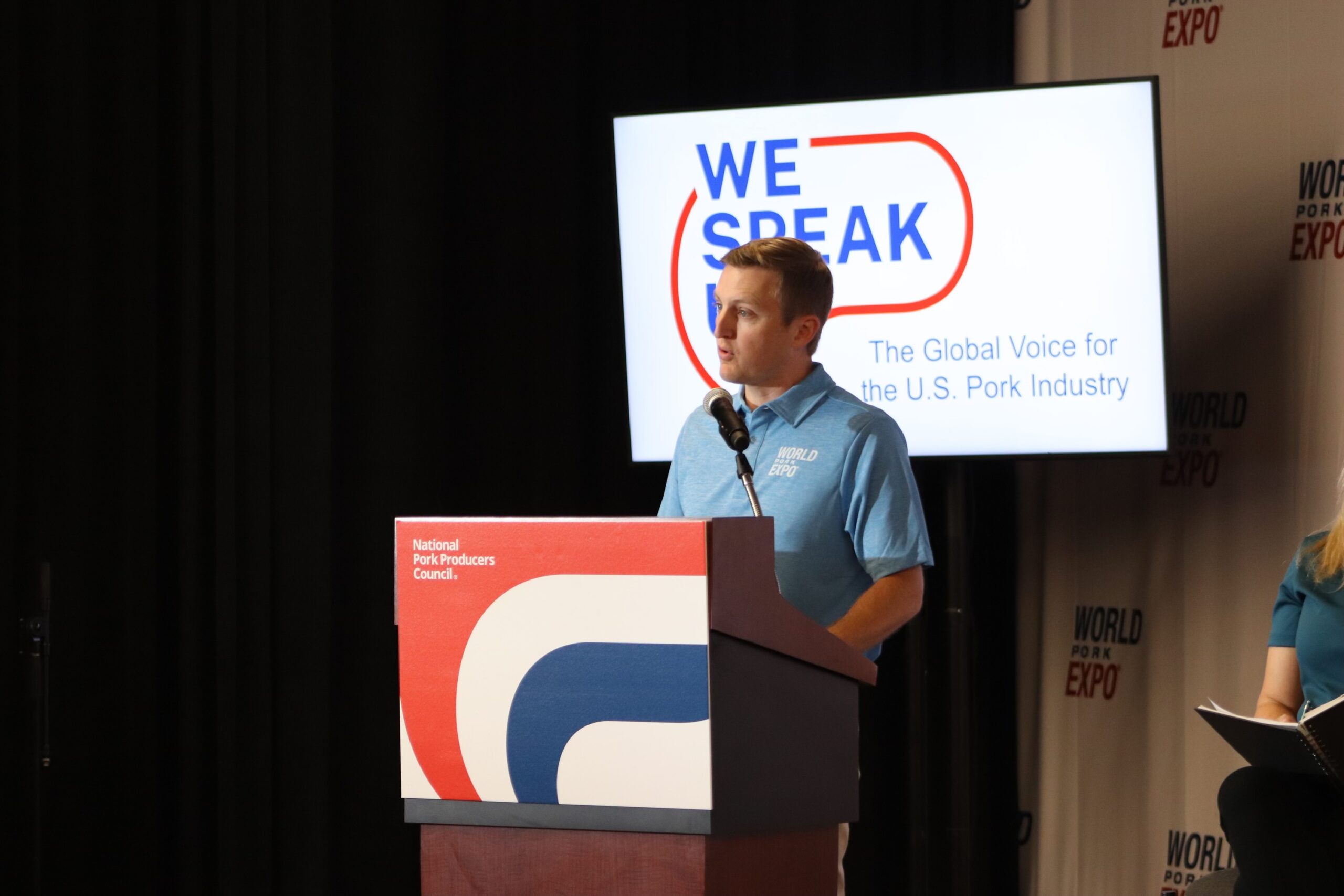
Bryan Humphreys, NPPC CEO.
Left to right: Bryan Humphreys, NPPC CEO, moderator Jennifer Shike, Farm Journal, Scott Hays, NPPC president, Andrew Bailey, NPPC science and technology, legal counsel, Dr. Anna Forseth, NPPC director of animal health, Maria C. Zieba, NPPC vice president of international affairs, and Christina Banoub, NPPC manager of competition, labor and tax issues.
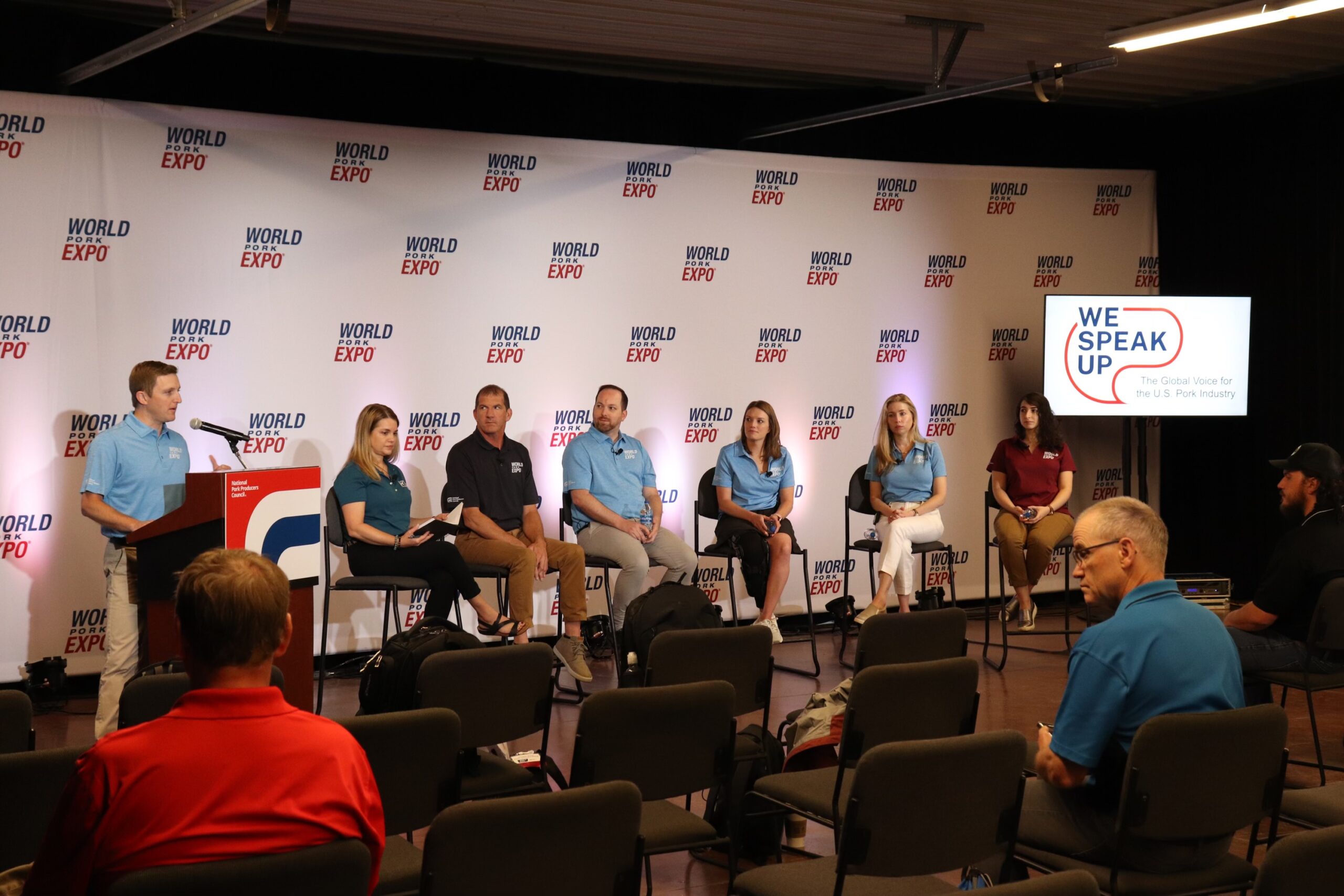
World Pork Expo Hosts Strategic Investment Program
What happened: During World Pork Expo, NPPC convened its valued investors of its Strategic Investment Program (SIP) for exclusive lunch programs to learn more about efforts to address the prevention of foreign animal disease and insight into NPPC’s advocacy efforts.
Dog detector makes a special visit: Joe Scheele, the California Agriculture Liaison for U.S. Customs and Border Protection (CBP), and “Oscar,” the adorable four-legged member of the Beagle Brigade. Located in Newnan, Georgia, the National Detector Dog Training Center is a vital program in training the Beagle Brigade agricultural canine teams. Oscar demonstrated how he and his fellow canines act as the first line of defense to sniff out potential invasive plant pests and harmful diseases at major international airports, border crossings and international mail and cargo facilitates.
NPPC’s Andrew Bailey, science and technology legal counsel, and Dr. Anna Forseth, director of animal health, joined the program to discuss how investment in NPPC’s SIP ensures a push for legislation to fund critical programs, such as the Beagle Brigade Act, to protect the U.S. pork industry. Dr. Forseth emphasized the importance of swine industry traceability efforts for all stages of production.
What does NPPC support: NPPC led nearly 60 agricultural and other organizations in supporting the Beagle Brigade Act of 2023 (H.R. 1480 and S. 759) was reintroduced in the U.S. House of Representatives and the U.S. Senate, which would provide permanent authorization for United States Department of Agriculture’s (USDA) National Detector Dog Training Center. NPPC urges Congress to pass the bipartisan bill quickly.
For Thursday’s event, NPPC CEO Bryan Humphreys moderated a panel with NPPC’s subject matter experts, Michael Formica, chief legal strategist, Cody McKinley, vice president of state and national relations, and Jeff Pigott, vice president of industry relations, informed investors of NPPC’s advocacy efforts.
Learn more about NPPC’s advocacy efforts for science-based approaches to swine health and production, as well as FAD preventative and preparedness efforts here.
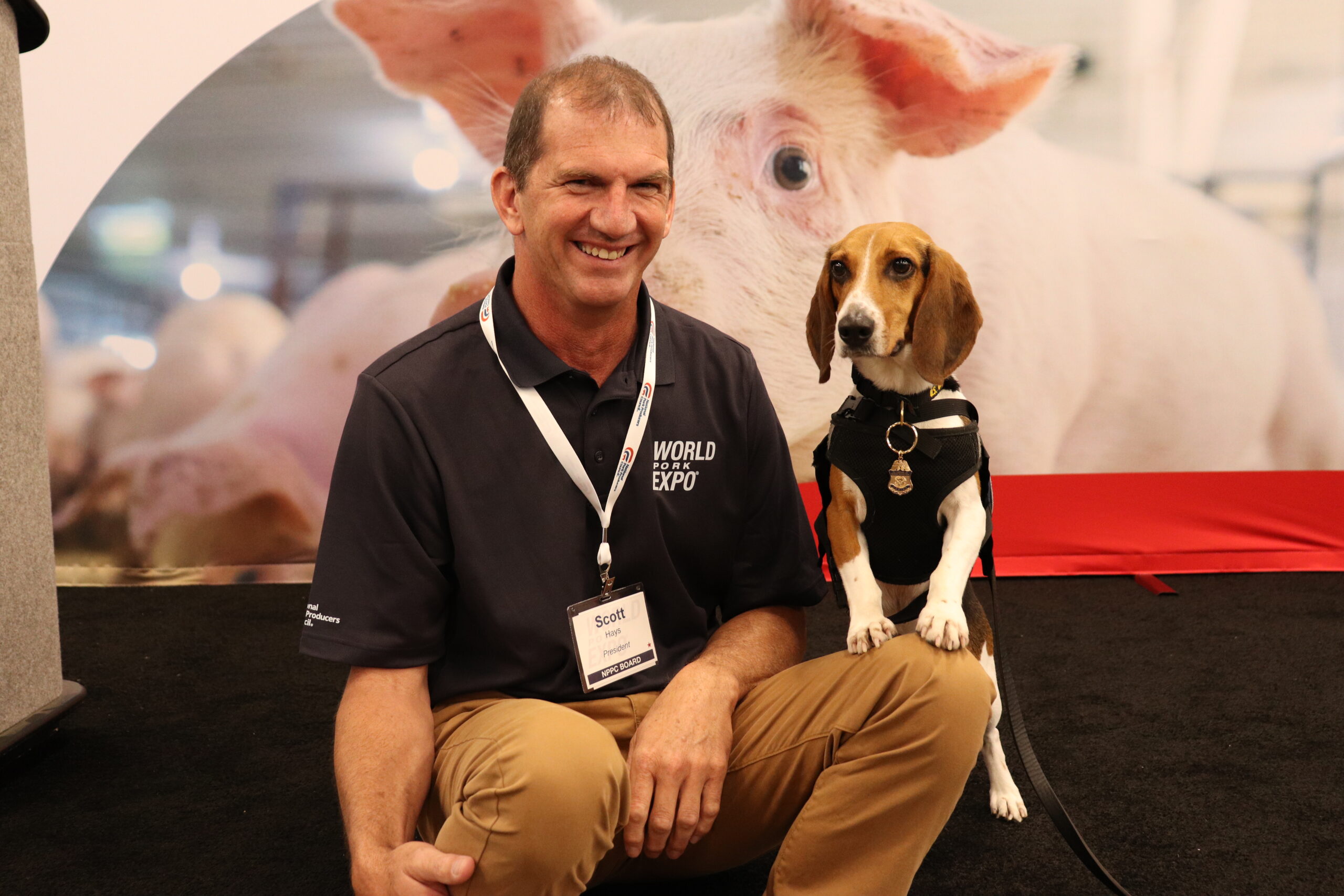
Left to right: Scott Hays, NPPC president, and Oscar, a four-legged member of the Beagle Brigade.
Oscar, a four-legged member of the Beagle Brigade.
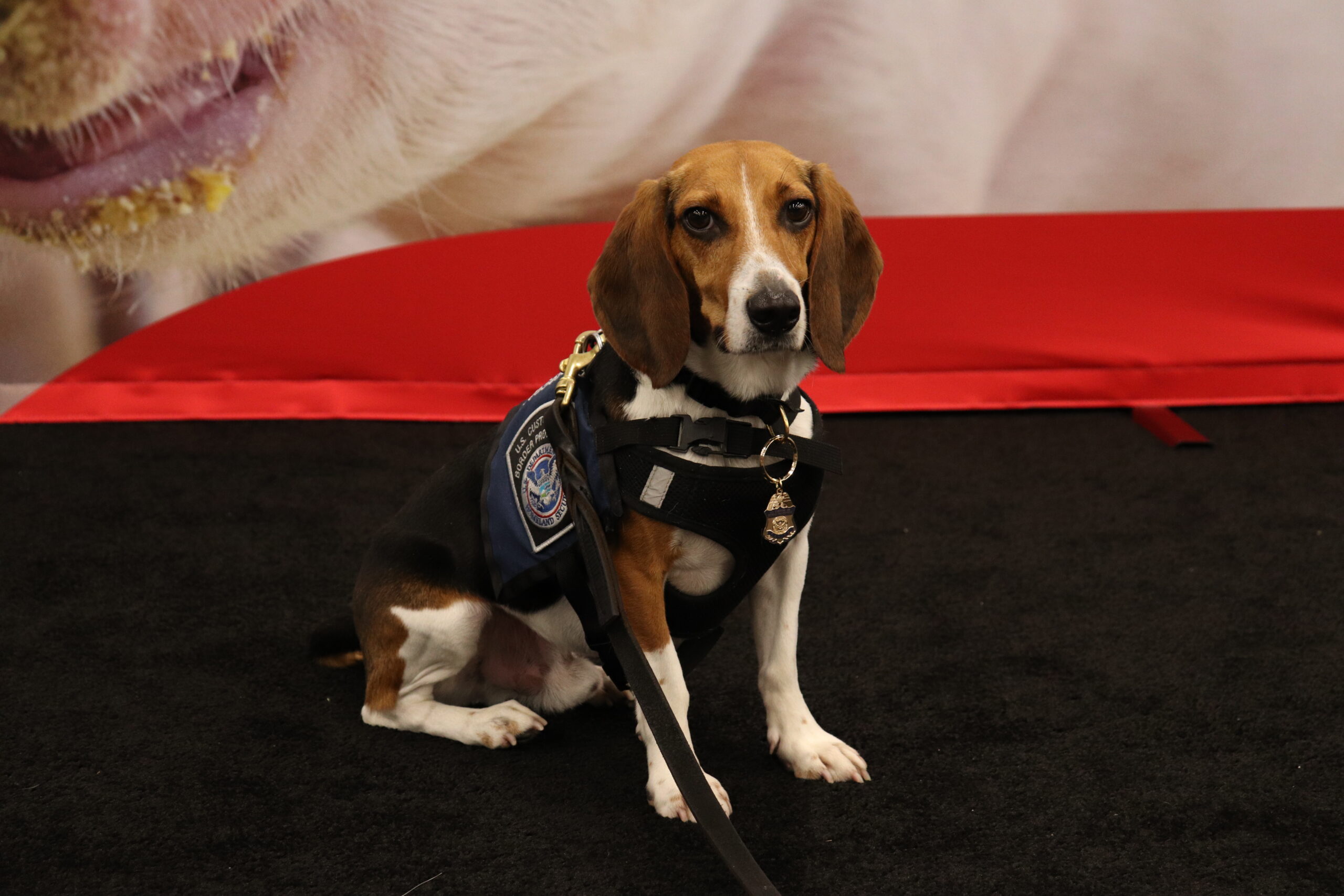
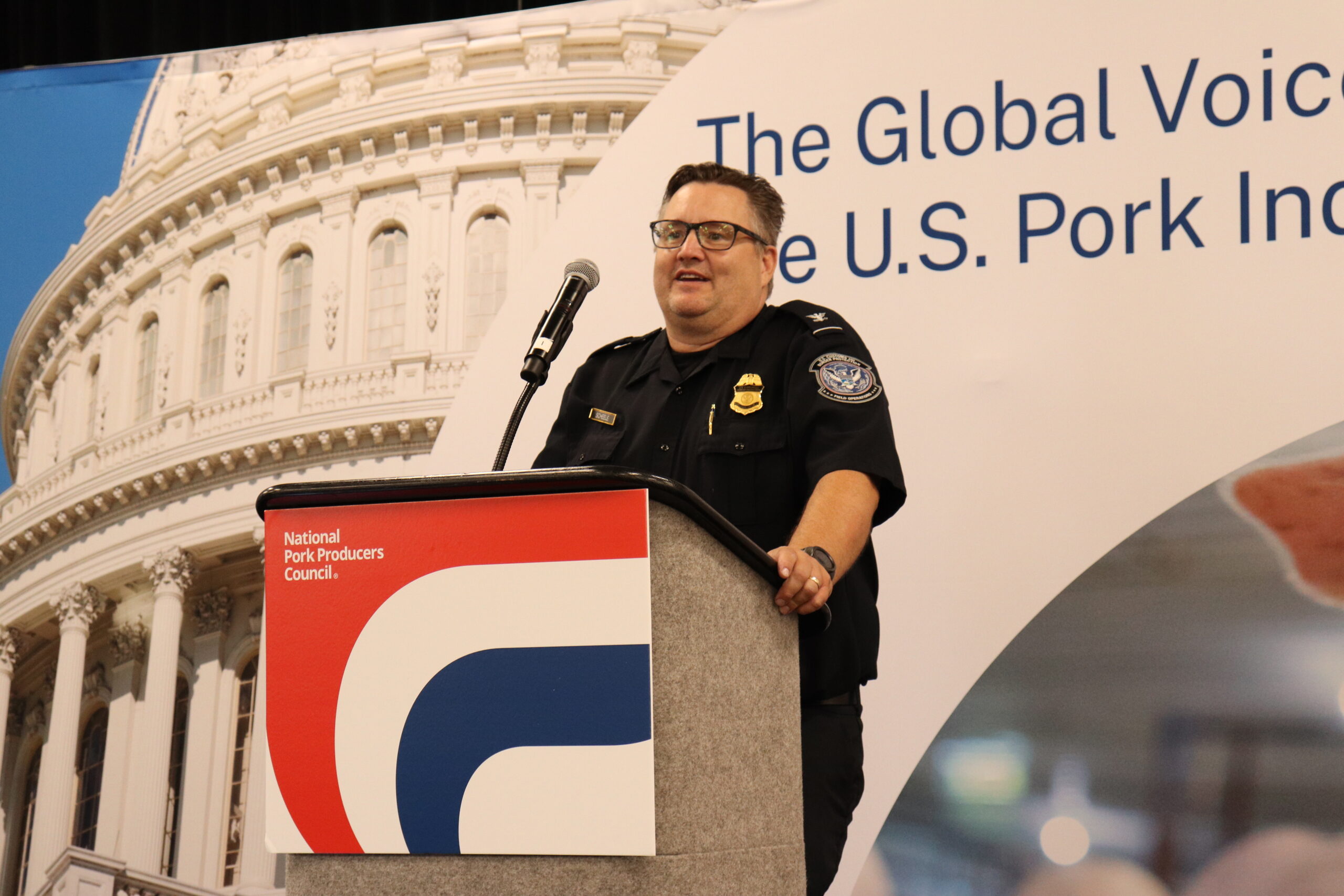
Joe Scheele, the California Agriculture Liaison for U.S. Customs and Border Protection (CBP).
Left to right: Bryan Humphreys, NPPC CEO, Michael Formica, NPPC chief legal strategist, Jeff Pigott, NPPC vice president of industry relations, and Cody McKinley, NPPC vice president of state and national relations.
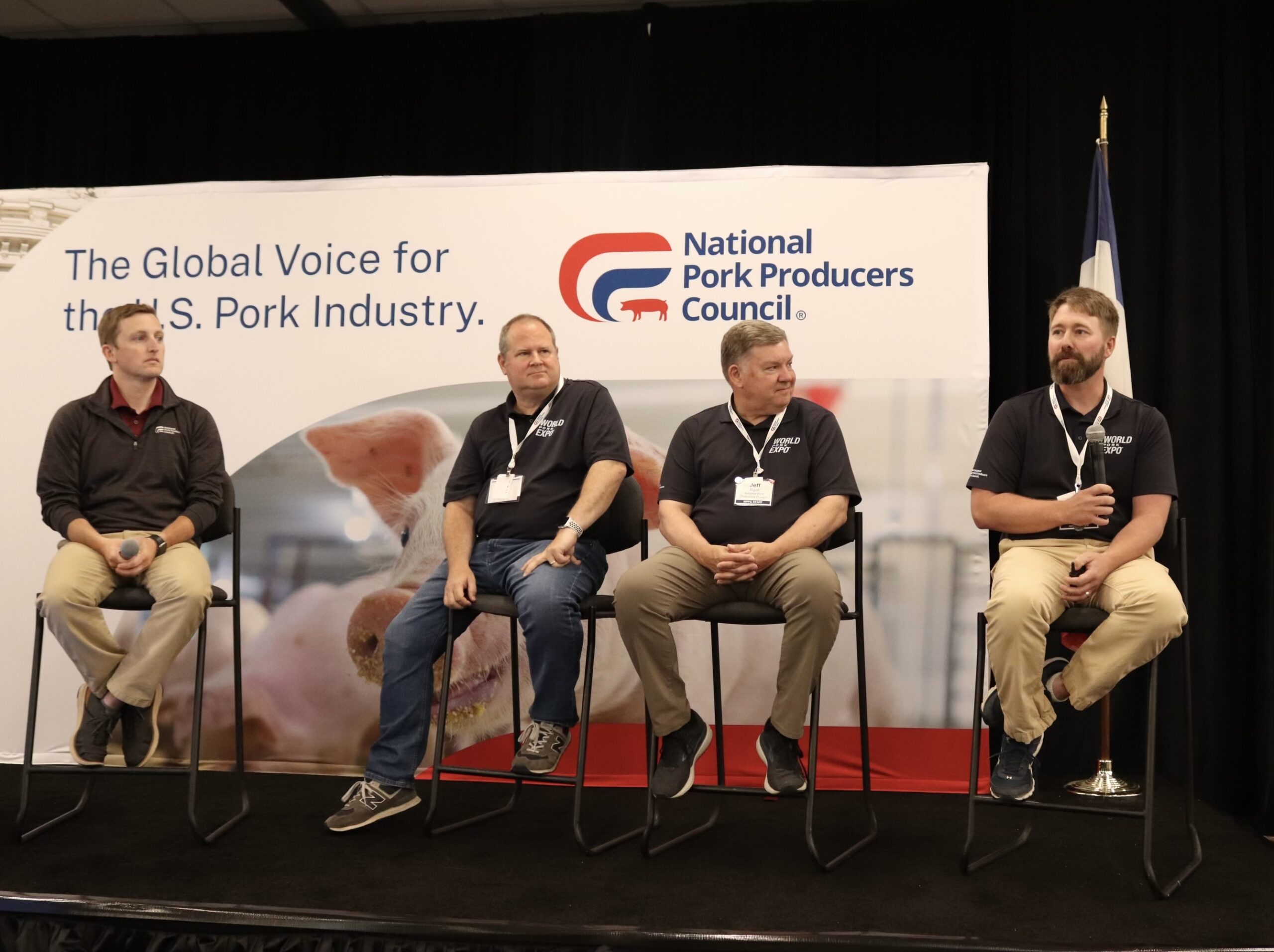
West Coast Ports Labor Talks Still Stalled
What happened: Labor talks between the union representing West Coast dockworkers and the association that owns the port facilities stalled last week amid a recent increase in work slowdowns at key marine terminals, including Long Beach, Los Angeles, Oakland and Seattle. The Pacific Maritime Association (PMA), which represents port operators, said the International Longshore and Warehouse Union (ILWU) announced staging several disruptions to west coast port operations.
Members of the ILWU, which represents more than 22,000 dockworkers at ports from California to Washington, have been working without a contract for almost a year, and talks between the union and the PMA have gone on for a year.
Why it matters: The U.S. pork industry depends on exports, which account for about a quarter of all sales annually and contribute significantly to every producer’s bottom line. About 60% of U.S. pork exports are transported by ocean freight, with the vast majority going out through West Coast ports to Asia – three of the U.S. pork industry’s top export markets are China, Japan and South Korea.
Port disruptions, including dockworker strikes and work slowdowns, can jeopardize the delivery of perishable commodities, costing agricultural producers millions of dollars and, potentially, foreign customers.
NPPC’s take: In March, NPPC joined 114 other agriculture and business organizations in a letter to President Biden, urging the administration to intervene in the labor negotiations. NPPC wants to avoid port disruptions such as those from late 2014 into early 2015 that negatively affected pork exports. Work slowdowns at the ports from San Diego to Seattle cost the U.S. meat industry millions of dollars in lost export sales.
Agriculture Coalition Backs Bill Boosting U.S.-U.K. Trade Deal
What happened: A coalition of 48 food and agriculture organizations, including NPPC, in a letter sent this week to the U.S. Senate and House of Representatives urging lawmakers to support legislation granting the President authority to negotiate, in consultation with Congress, a comprehensive trade agreement between the United States and the United Kingdom (U.K.).
The “Undertaking Negotiations on Investment and Trade for Economic Dynamism (UNITED) Act,” S. 629 and H.R. 3653, was introduced by Sens. Chris Coons (D-DE) and John Thune (R-SD) and Reps. Jim Himes (D-CT) and Adrian Smith (R-NE).
The coalition letter was sent to Congress a day before a White House meeting between President Biden and U.K. Prime Minister Rishi Sunak.
Why it matters: The U.K. has a population of 67 million and cultural and culinary tastes like the United States. While it imported $2.3 billion of pork in 2022 – making it one of the world’s top pork importers – because of the tariff and non-tariff barriers, the U.K. took just $3.8 million of U.S. pork.
In the spring of 2022, the Office of the U.S. Trade Representative began negotiations with the United Kingdom through the U.K.-U.S. Dialogues on the Future of Atlantic Trade. The talks largely focused on issues outside of agricultural trade, however, supply chain disruptions and global food security related to the war in Ukraine were discussed.
NPPC’s take: NPPC strongly supports closer trade relations with the U.K. since it began the process of leaving the European Union. The organization would welcome a comprehensive trade agreement with the U.K. if willing to eliminate all tariff and non-tariff barriers and embrace international production standards. Last year, NPPC CEO Bryan Humphreys met with George Eustice, the U.K.’s secretary of State for Environment, Food and Rural Affairs, to discuss the need for U.S. pork to have better access to the U.K. market.